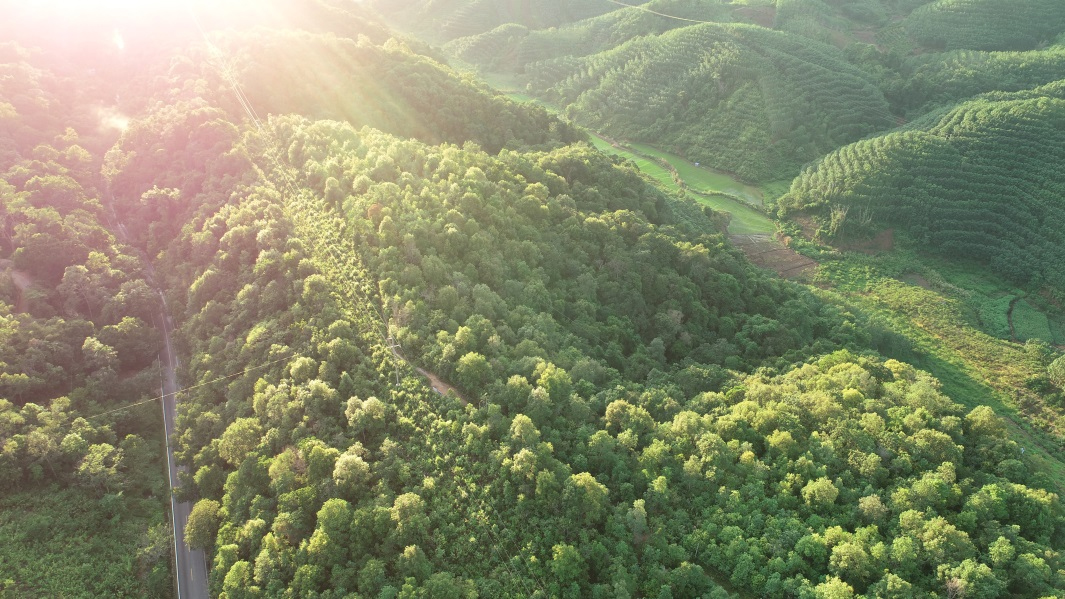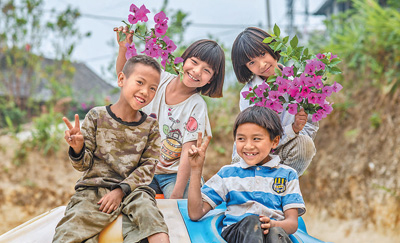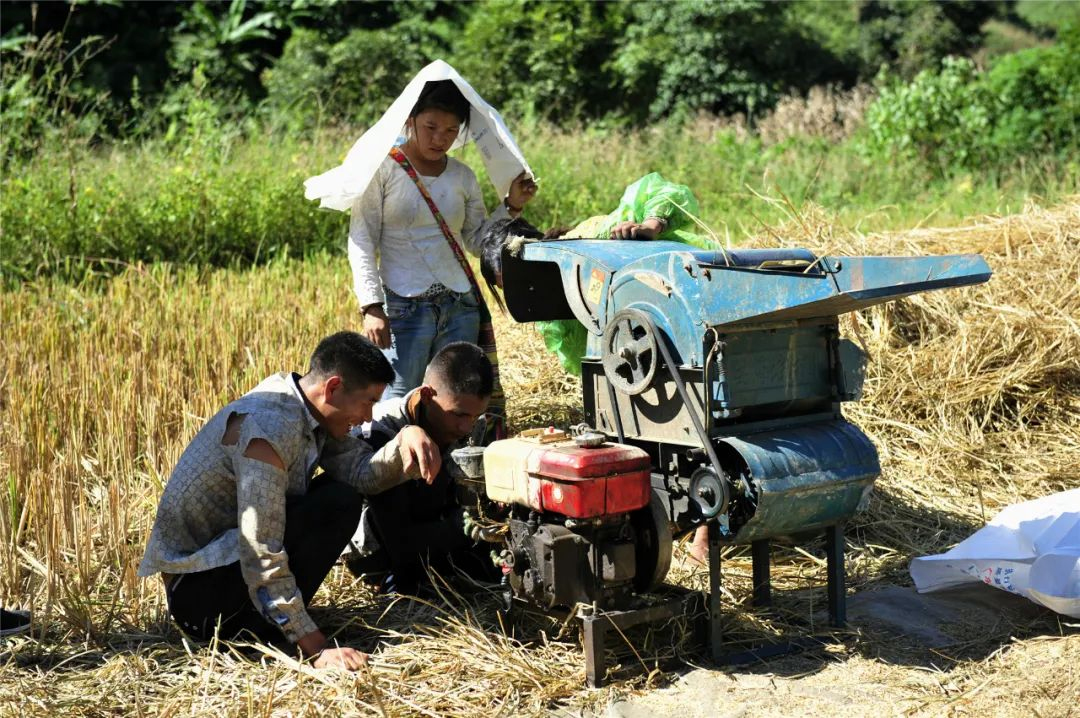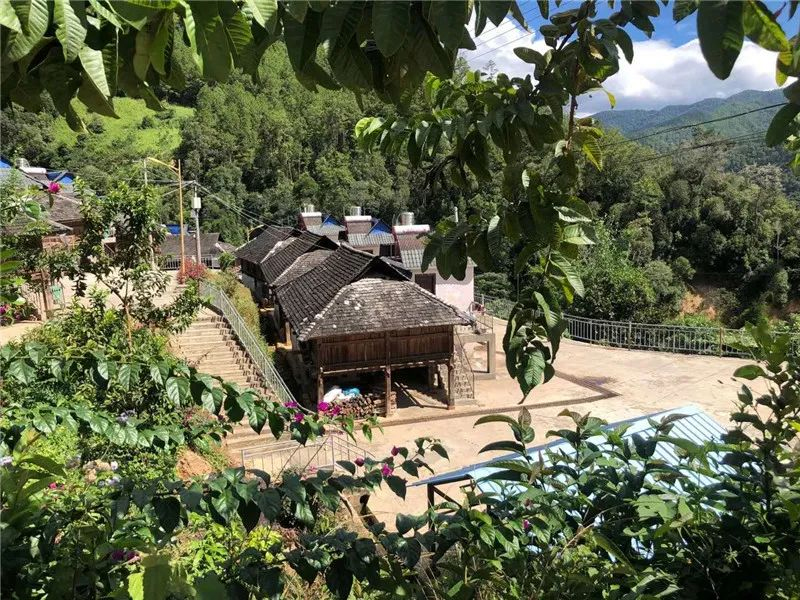

With 3,439 mu (about 229.27 hectares) of woodlands, 502 mu of arable land, annual average temperature of 23 degrees Celsius, and annual precipitation of 1374 millimeters, Manbansandui hamlet located in the mountainous area of southwest China’s Yunnan province is a place where “whatever sowed can flourish”.
However, such a great place for growing crops was classified as severely impoverished village in 2014.
As a natural village of Mannan village in Bulangshan township, Menghai county, Xishuangbanna Dai autonomous prefecture of Yunnan province, Manbansandui hamlet is inhabitated by people of Lahu ethnic group, who experienced a dramatic change in society from primitive society directly to socialist society after the founding of the People’s Republic of China.
After two times of relocation and years of construction of supporting facilities, villagers in Manbansandui hamlet now live in wooden stilt houses.
The per capita net income of residents in the hemlet jumped from 350 yuan ($53.2) in 2008 to 2,380 yuan in 2014. However, it was still below the national poverty line in 2014.
“One of the major causes of poverty was low level of education,” said Luo Zhihua, head of the poverty alleviation working group stationed in Manbansandui hamlet.
Almost none of the villagers above the age of 16 has been to school, and most of them do not understand and cannot speak Mandarin Chinese, according to Luo, who added that most of the 58 residents in the village have never left the village.
Since they were dispatched to Manbansandui hamlet at the end of 2015, Luo and his fellow team members have made continuous efforts to help improve the literacy of the locals, change their outdated ideas and notions, and enhance their initiative in seeking development.

Photo taken on June 30 shows rainforest showered in the morning sunshine in Xishuangbanna Dai autonomous prefecture, southwest China’s Yunnan province. (Photo by Shao Bin/People’s Daily Online)
Besides hunting and gathering food, villagers in Manbansandui hamlet also grow tea, transplant rice seedlings, and raise pigs.
In the eyes of Luo, villagers took a laissez-faire attitude toward the crops they planted in the past. Their tea trees were of old varieties, and they never made plans for growing and simply let nature take its course. Besides, they neither watered nor weeded their rice fields.
The poverty alleviation working group then adopted the approach of unified organization, management and sale for farming, and helped villagers gradually learn and get used to more scientific methods such as introduction and breeding of new varieties, fine planting, weeding and fertilization.
Over the years, villagers of Manbansandui hamlet have tasted the fruits of the new production modes.
Rice and corn are now grown in two seasons in the village, instead of just one in the past.
The rice yield per mu has increased from 299 kg to 560 kg. Since the annual rice output of the village can support villagers for three years, Manbansandui hamlet no longer needs relief grain from government.
At the same time, the tea planting area of the village has grown from 60 mu to 460 mu, generating an average annual income of 1,165 yuan for each household.
The family of Nasi, a villager in the hamlet, now owns 8 mu of rice paddies, 4 mu of cornfields, and five pigs. The family of seven sees good rice harvest every year. The rice they collect is always more than they could eat. They feed their pigs and chickens on corn.

Children in Manbansandui hamlet, Xishuangbanna Dai autonomous prefecture, southwest China’s Yunnan province, smile happily in front of camera. (Photo/Xinhua)
Nasi and her husband hold high expectations of their new tea garden, which covers an area of nearly 30 mu and will be ready for picking tea leaves next year.
The couple received training in tea picking and raw tea processing from a factory under Taetea Group, world’s largest Pu’er tea group. Nasi’s husband even took part in a tea art competition in Menghai county.
“Tea produced in Bulangshan township is famous. Many bosses outside the village have contacted me via WeChat to buy tea,” Nasi said happily.

Villagers in Manbansandui hamlet, Xishuangbanna Dai autonomous prefecture, southwest China’s Yunnan province, use machinery in the fields. (Photo/The Paper)
The poverty alleviation working group has organized cultural training for young and middle-aged residents in the village.
Villagers aged between 18 and 45 years old all came to take part in the training, said Li Huobao, a member of the poverty alleviation working group.
“We started by teaching them how to hold a pen correctly. Eventually 15 of them received a certificate for Mandarin training,” Li added.
In an effort to encourage villagers to take part in activities such as improving the living environment and transforming social traditions, and change their old-fashioned ideas and living habits bit by bit, the working group has also established a shop that allows villagers to exchange the credits they gained because of good behavior for daily necessities.

Manbansandui hamlet, Xishuangbanna Dai autonomous prefecture, southwest China’s Yunnan province, takes a brand new look. (Photo/The Paper)
So far, Manbansandui hamlet has basically shaken off poverty. All registered poverty stricken households in the village have been freed from worries over food and clothing and have access to compulsory education, basic medical services and safe housing.
In addition, many residents in the hamlet have learnt to use short video platform Tik Tok, shop online, and contact tea buyers via WeChat.
Villagers of the hamlet have also started to show their talents in cultural activities and celebrations held by Bulangshan township and Xishuangbanna Dai autonomous prefecture.

 Award-winning photos show poverty reduction achievements in NE China's Jilin province
Award-winning photos show poverty reduction achievements in NE China's Jilin province People dance to greet advent of New Year in Ameiqituo Town, Guizhou
People dance to greet advent of New Year in Ameiqituo Town, Guizhou Fire brigade in Shanghai holds group wedding
Fire brigade in Shanghai holds group wedding Tourists enjoy ice sculptures in Datan Town, north China
Tourists enjoy ice sculptures in Datan Town, north China Sunset scenery of Dayan Pagoda in Xi'an
Sunset scenery of Dayan Pagoda in Xi'an Tourists have fun at scenic spot in Nanlong Town, NW China
Tourists have fun at scenic spot in Nanlong Town, NW China Harbin attracts tourists by making best use of ice in winter
Harbin attracts tourists by making best use of ice in winter In pics: FIS Alpine Ski Women's World Cup Slalom
In pics: FIS Alpine Ski Women's World Cup Slalom Black-necked cranes rest at reservoir in Lhunzhub County, Lhasa
Black-necked cranes rest at reservoir in Lhunzhub County, Lhasa China's FAST telescope will be available to foreign scientists in April
China's FAST telescope will be available to foreign scientists in April